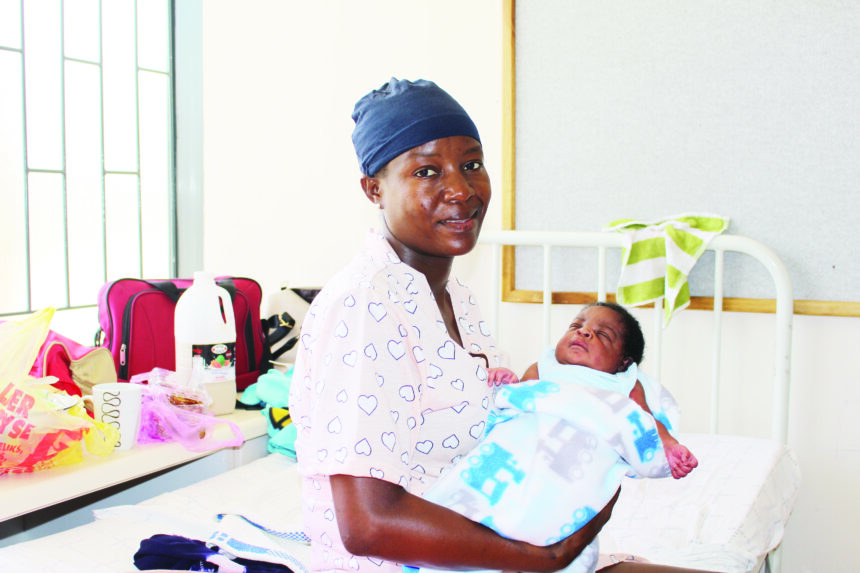The days when mothers could be dismissed from work for being pregnant, compelled to do work that is harmful to their health or that of their unborn child, or lose income during pregnancy, are over.
With the ratification of the International Labour Organisation (ILO) Convention No. 183 of 2000 on Maternity Protection, such practices will no longer be permitted in the country. Also known as the Maternity Protection Convention, it sets standards for maternity leave and related benefits.
The convention supports the right of mothers to health protection, maternity leave benefits and leave in case of illness or complications, amongst other provisions.
Last week, deputy labour minister Hafeni Ndemula motivated the ratification in Parliament.
The legislation, still under further deliberation in the National Assembly, has thus far received overwhelming support from lawmakers.
The convention applies to all women in all sectors of the economy, including those in the informal economy.
Ndemula submitted that the convention aims to preserve the health of expectant and nursing mothers and their newborn babies, while providing job and income security (protection from dismissal and discrimination, the right to resume work after leave, and maintenance of wages and income during maternity).
“The convention provides for maternity leave for a period of 14 weeks in relation to childbirth. Maternity leave is crucial for safeguarding the health of the mother and her child immediately before and after birth, considering the physiological demands associated with pregnancy and childbirth,” he noted.
Furthermore, the convention entitles women to daily breaks, or a reduction in working hours to enable them to breastfeed their babies.
This provision enables mothers to continue breastfeeding their babies even after they return to work.
“This is in the best health interests of both mother and child, and aligns with the World Health Organisation’s recommendation for exclusive breastfeeding of babies until the age of six months. The daily breastfeeding breaks or reduced working hours will be counted as working time, and remunerated accordingly,” he informed Parliament.
Support
Swapo backbencher Tobie Aupindi commended the ministry for the ratification, noting that women have long faced challenges regarding fringe benefits and entitlements before and after maternity leave.
“I know the additional benefits are not much different from what is in the Labour Act, but we can actually do more,” he said.
Ndemula also indicated that he will suggest amendments to the current labour law.
Aupindi emphasised that once those amendments are made, it is crucial to ensure that women receive adequate benefits when they go on maternity leave.
“Many women are hesitant to become mothers because there is no support for them to balance work and motherhood,” he stated.
Drawing from his experience in the corporate sector, Aupindi pointed out that many critical promotions occur while women are on maternity leave.
“They are not even protected in terms of being eligible for promotion while on maternity leave. As a result, many women delay taking leave until the last possible moment after discovering they are pregnant,” he continued.
Information minister Emma Theofelus likewise supported the ILO convention, noting that it not only addresses maternity protection, but also promotes equal opportunities and treatment for both male and female workers.
“In Namibia, there is a growing number of girls attending school and graduating from higher education, leading to increased female participation in the workforce and entrepreneurship. This shift is expected to result in a workforce that better reflects the country’s female-majority population. The adoption of this new convention, which includes longer maternity leave and better benefits for women, will soon be integrated into the country’s labour law,” she said.
Male affairs
Meanwhile, Popular Democratic Movement (PDM) chief whip Elma Dienda expressed concern that while the convention speaks about equal opportunities, it is misleading because it doesn’t address the safety of men.
“Where does this equal opportunity for men come in? It’s misleading, because I was expecting to find benefits for males in this convention, which I could not,” she said.
Dienda’s concern was clarified by National Assembly Speaker Peter Katjavivi, who noted that women have historically been disadvantaged, and efforts must be made to achieve equality.
Not equal
While other MPs applauded the motivation, Landless People’s Movement leader and chief change campaigner Bernadus Swartbooi seemed unimpressed.
He questioned what measures would be put in place to address the potential for women to excessively reproduce while on maternity leave.
Swartbooi warned that the convention could be abused, leading to a collapse of the system.
He also argued that the agenda of gender equality is being pushed to the detriment of boys, suggesting that gender equality is a Western concept, and that men are being silenced to accommodate a fictional notion of equality, as he believes men and women are not equal.
Following suit
Once the convention is adopted, Namibia will join other African countries such as Mali and Mauritius, which have committed to the convention’s standards for maternity leave, healthcare and job protection for pregnant women and new mothers.
Similarly, Kenya has introduced the Breastfeeding Mothers Bill 2024, which imposes new legal obligations on employers to support breastfeeding mothers.
Caption:



